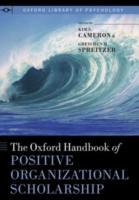Positive Organizational Scholarship (POS) is an umbrella concept used to emphasize what elevates and what is inspiring to individuals and organizations by defining and improving on the challenging, broken, and needlessly difficult. Just as positive psychology explores optimal individual psychological states rather than pathological ones, POS focuses attention on the generative dynamics in organizations that lead to the development of human strength, foster resiliency in employees, enable healing and restoration, and cultivate extraordinary individual and organizational performance. While POS does not ignore dysfunctional or typical patterns of behavior, it is most interested in the motivations and effects associated with remarkably positive phenomena--how they are facilitated, why they work, how they can be identified, and how organizations can capitalize on them.This handbook is the first major resource for scholars and professionals interested in learning about POS. Across 79 chapters, authors comprehensively review basic principles, empirical evidence, and ideas for future research relating to POS. They focus on using a positive lens to address problems and challenges in organizational life and they draw on POS to expand the domain of other disciplines including ethics, economics, peace, spirituality, social movements, and sustainability. This volume is an ideal resource for organizational scholars, students, practitioners, human resource managers, and professional associations, with coverage of the full spectrum of organizational theories and outcomes that define, explain, and predict the occurrence, causes, and consequences of positivity.

